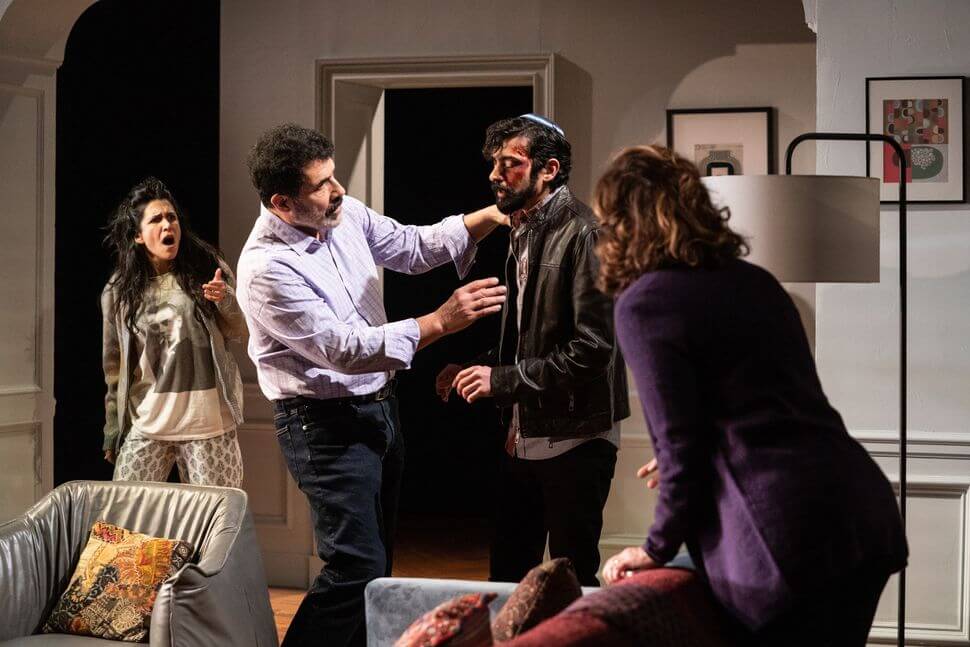Should Jews start asking if it’s safe to stay in the United States?
A Broadway play sparks questions about home, antisemitism and security

Francis Benhamou, Jeff Seymour and Yair Ben-Dor in “Prayer for the French Republic” Photo by Matthew Murphy
“We are Jews. The only reason we’re still on this planet is because we learned to get out of dangerous situations before they got the better of us… It’s the suitcase or the coffin.”
These chilling lines in Joshua Harmon’s play Prayer for the French Republic, which closes on Broadway this weekend, made me reevaluate things I’ve held true throughout my life and more than four decades as a Jewish communal professional. Now, amid Israel’s grueling war with Hamas, I’m hearing for the first time conversations about whether it is safe to stay in the United States..
There are media reports of increasing anxiety among Jews in New York City, where antisemitic incidents have soared by more than 200% since last year. Among those who were considering making aliyah, some are accelerating their plans to move to Israel.
Since the Oct. 7 terrorist attack by Hamas, and amid global backlash to Israel’s military response in Gaza, antisemitism has “skyrocketed” around the world, according to the ADL. We’ve all seen the images in the news and on our social media feeds: huge crowds shouting, “from the river to the sea,” and violent threats against Jewish students on college campuses across the country.
My grandparents spoke of antisemitism in Russia as their impetus for emigrating — along with millions of others — to the United States, then known as the “Goldene Medina,” the Golden Land. But it wasn’t all golden. My parents told me about college quotas for Jewish admissions, and country clubs and even entire towns that were off limits to Jews.
Growing up in suburban Wayne, New Jersey in the 1950s and 60s, I had no personal experiences with antisemitism. But my childhood was marked by one public incident: In 1967, when I was 12 years old, the vice president of the board of education warned town residents not to vote for two Jews running for the board since “Most Jews are liberals, especially when it comes to spending for education. Two more votes and we lose what is left of Christ in our Christmas celebrations in our schools. Think about it.”
His comments received national attention. I was young, but I sensed that the episode changed the town, adding new tension into relationships between Jews and non-Jews.
As a former executive at several Jewish federations, I’ve dealt with occasional swastika graffiti, an outspoken anti-Israel and antisemitic Georgia Congressional representative, and a (very) small Westboro Baptist Church protest in Atlanta. But I’ve never seen anything like today’s explosion of anti-Israel and antisemitic vitriol — on the streets, on college campuses, and on social media feeds.
Prayer for the French Republic takes its title from a prayer that has been recited in French synagogues for the government since the early 19th century, similar to the prayer for America widely said in American synagogues. The play follows five generations of a French family, the Benhamous, through 73 years of history, toggling between the mid-1940s and 2016 and 2017. The narratives begin to blend around the common theme of whether it’s safe to be a Jew in France.
When a young family member who wears a kippah comes home bloodied after being attacked on Shabbat in 2016, the family is plunged into passionate conversations about Zionism, nationalism, what it means to feel safe, and most importantly, whether to stay in France or move to Israel.
In a line that feels especially prescient today, one character says, “Something is happening in the world, and it’s happening in our country too — I can feel it.”
Jews around the world are, to borrow the play’s language, feeling it. I don’t believe that what’s going on now in the U.S. is analogous to pre-war Germany. So far, none of the antisemitic activities here or in Europe have been government-sanctioned, and thankfully, most leaders have forcefully condemned such behavior.
What is new, however, is that antisemitism is exploding from both ends of the political spectrum. White supremacists and progressives are strange bedfellows. But increasingly, bedfellows they are when it comes to hatred of Jews.
Should we stay, or go? Jews have been asking themselves this question for millennia. History is replete with expulsions and mass migrations that have uprooted previously secure Jewish families and communities. Jews lived peacefully in Spain for 1,400 years before the Spanish Inquisition forced them out, and for 500 years in Algeria before leaving en masse in 1962.
In Prayer for the French Republic, the Benhamou family finally decides to make aliyah to Israel, joining a wave of French Jews to do the same in the past decade following a series of antisemitic attacks, including one on a kosher supermarket in Paris that killed four.
Those of us in the U.S. used to have conversations about Jews “elsewhere” — in France or England — and whether it’s safe for them “over there.” American Jews are now awakening from a multi-generational and comfortable slumber that relegated antisemitism to the dustbin of history. We’ve taken our safety, and our acceptance, for granted.
American Jews are not leaving just yet. But since seeing Prayer for the French Republic, I’ve been wondering just what would it take for us to start asking ourselves the question posed by the Benhamou family, most of our grandparents and great-grandparents, and countless other Jews over the millennia. Should we stay… or go?
















